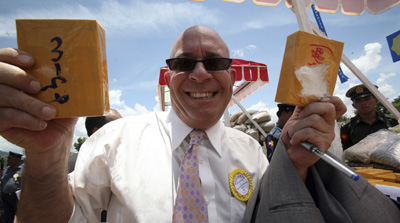Bangkok, July 1, 2011–Ross Dunkley, founder and editor of the Myanmar Times newspaper, was convicted of assault and set free for time already spent in detention by a Burmese court on Thursday.
The verdict, which carried a 30-day jail term, acquitted Dunkley of other charges viewed by many journalists as trumped up by authorities to put pressure on his news operation.
The conviction represented an automatic breach of Burmese immigration laws that carried a possible six months in prison or 100,000 kyat (US$120) fine. Dunkley, an Australian national, opted to pay the fine and told reporters outside the court room that he planned to appeal the verdict.
He was first arrested on the charges on February 10 and released on bail on March 27 while his case was still pending. After his arrest, he was accused of assaulting, drugging, and detaining a woman whom press reports identified as a prostitute. Dunkley denied all the charges. The woman had tried to drop the charges, but it was disallowed by the court. Dunkley faced a potential 15 years in prison if convicted of all the charges filed against him.
Burma’s newly installed democratic government has sent signals it will allow for more press freedom, including an end to prior censorship of non-news publications.
“We welcome the resolution of Ross Dunkley’s case, but reiterate our concerns that the charges were initially politically motivated,” said Bob Dietz, CPJ’s Asia program coordinator. “With newly elected President Thein Sein’s recent commitment to allow for more press freedom, we would hope such arbitrary harassment is a relic of Burma’s military-run past.”
News reports noted at the time that Dunkley’s arrest coincided with intense negotiations between Dunkley and his government-linked Burmese partners about the publication’s future management, strategy and ownership. Days after his arrest, Tin Tun Oo, Dunkley’s local partner, assumed Dunkley’s position as chief executive of the local-foreign joint venture.
Apart from state mouthpiece newspapers, all Burmese news publication–including the Myanmar Times–are subjected to strict prior censorship, forcing them to publish on a weekly rather than daily basis. There has been no indication so far that Thein Sein’s government intends to end that practice.
